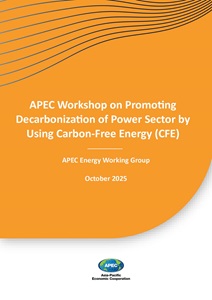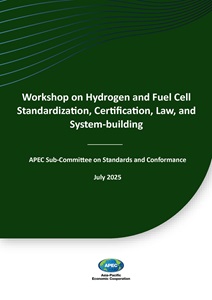
Proceedings
APEC Workshop on Promoting Decarbonization of Power Sector by Using Carbon-Free Energy (CFE)
The Asia-Pacific Economic Cooperation (APEC) is a regional economic forum established in 1989 to leverage the growing interdependence of the Asia-Pacific.
The Asia-Pacific Economic Cooperation (APEC) is a regional economic forum established in 1989 to leverage the growing interdependence of the Asia-Pacific.
APEC ensures that goods, services, investment and people move easily across borders. Members facilitate this trade through faster customs procedures at borders; more favorable business climates behind the border; and aligning regulations and standards across the region.
APEC ensures that goods, services, investment and people move easily across borders. Members facilitate this trade through faster customs procedures at borders; more favorable business climates behind the border; and aligning regulations and standards across the region.
APEC works to help all residents of the Asia-Pacific participate in the growing economy.
APEC works to help all residents of the Asia-Pacific participate in the growing economy.
Capacity building projects play an important role in helping translate APEC's goals into reality.
Capacity building projects play an important role in helping translate APEC's goals into reality.

Reports
•July 2025
Download Report
4MB
Published Under
Committee on Trade and Investment (CTI), Sub-Committee on Standards and Conformance (SCSC)
Accessed
495
Pages
30
This report presents the outcomes of the APEC project “Workshop on Hydrogen and Fuel Cell Standardization, Certification, Law, and System-Building,” held in Gyeongju, Republic of Korea, on 26 February 2025. The project aimed to enhance institutional capacity and policy coordination among APEC economies to support the development of a sustainable hydrogen economy. The report highlights key discussions from the workshop, including best practices in legal and regulatory frameworks, clean hydrogen certification systems, infrastructure development, and participation in international standards such as ISO/TC 197 and IEC/TC 105. It concludes with six key policy recommendations: (1) strengthen market-based mechanisms such as carbon pricing and clean hydrogen auctions, (2) adopt and harmonize hydrogen certification systems, (3) expand participation in international standardization efforts, (4) prioritize infrastructure development and investment, (5) enhance capacity building for institutions and professionals, and (6) promote regional pilot projects to test and deploy hydrogen technologies. These recommendations support APEC’s broader goals of decarbonization, trade facilitation, and regulatory alignment.

